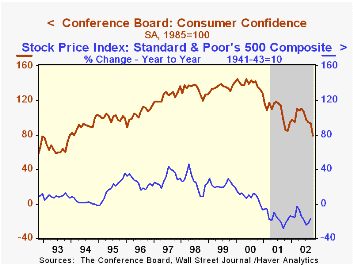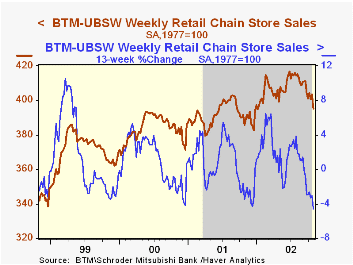 Global| Oct 29 2002
Global| Oct 29 2002Consumer Confidence Plunged
by:Tom Moeller
|in:Economy in Brief
Summary
The Conference Boards Index of Consumer Confidence fell quite a bit more than expected in October, to 79.4. Consensus expectations were for a reading of 90.0. September's level was revised up slightly. The 15.3% m/m decline in [...]

The Conference Board’s Index of Consumer Confidence fell quite a bit more than expected in October, to 79.4. Consensus expectations were for a reading of 90.0. September's level was revised up slightly.
The 15.3% m/m decline in Consumer Confidence was the sharpest since July 1992 and was much deeper than suggested by the Consumer Sentiment reading from the University of Michigan.
The decline reflected sharply lower readings of the present situation and consumer expectations.
During the last ten years there has been a 33% correlation between the level of Consumer Confidence and the y/y percent change in the S&P 500.
The Conference Board's survey is conducted by a mailed questionnaire to 5,000 households and about 3,500 typically respond.
| Conference Board | Oct | Sept | Y/Y | 2001 | 2000 | 1999 |
|---|---|---|---|---|---|---|
| Consumer Confidence | 79.4 | 93.7 | -6.9% | 106.6 | 139.0 | 135.3 |
by Tom Moeller October 29, 2002

Chain store sales fell sharply last week according to the BTM-UBSW survey. Sales plummeted 1.9% following a 0.6% gain the week prior. It was the sharpest one-week decline since December 2000.
With a little less than a week remaining, sales in October were 1.5% below the average for September which was down 1.1% from August.
During the last five years there has been a 62% correlation between the year-to-year percent change in monthly chain store sales and the change in GAF retail sales. There has been a 18% correlation between the month-to-month change in the two sales series.
| BTM-UBSW (SA, 1977=100) | 10/26/02 | 10/19/02 | Y/Y | 2001 | 2000 | 1999 |
|---|---|---|---|---|---|---|
| Total Weekly Retail Chain Store Sales | 395.5 | 403.3 | 2.6% | 2.1% | 3.4% | 6.7% |
Tom Moeller
AuthorMore in Author Profile »Prior to joining Haver Analytics in 2000, Mr. Moeller worked as the Economist at Chancellor Capital Management from 1985 to 1999. There, he developed comprehensive economic forecasts and interpreted economic data for equity and fixed income portfolio managers. Also at Chancellor, Mr. Moeller worked as an equity analyst and was responsible for researching and rating companies in the economically sensitive automobile and housing industries for investment in Chancellor’s equity portfolio. Prior to joining Chancellor, Mr. Moeller was an Economist at Citibank from 1979 to 1984. He also analyzed pricing behavior in the metals industry for the Council on Wage and Price Stability in Washington, D.C. In 1999, Mr. Moeller received the award for most accurate forecast from the Forecasters' Club of New York. From 1990 to 1992 he was President of the New York Association for Business Economists. Mr. Moeller earned an M.B.A. in Finance from Fordham University, where he graduated in 1987. He holds a Bachelor of Arts in Economics from George Washington University.
More Economy in Brief
 Global| Feb 05 2026
Global| Feb 05 2026Charts of the Week: Balanced Policy, Resilient Data and AI Narratives
by:Andrew Cates






